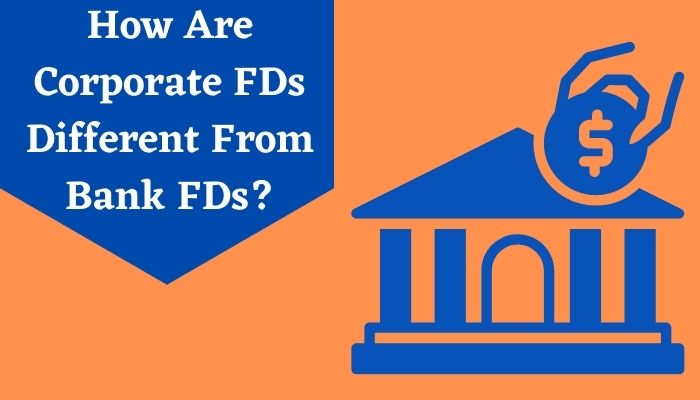How Are Corporate FDs Different From Bank FDs?
Fixed deposits are the most preferred investment option for Indians. FDs are safe in nature and offer guaranteed returns on investments. Whether you are planning for a foreign trip or want to accumulate a hefty amount for your retirement, FDs are the most favorite option.

If you are planning to open a fixed deposit account, you may get confused about whether you should invest in a corporate FD or you should invest in Bank FDs in India.
What are Corporate Fixed Deposits?
Many corporate companies and non-financial banking companies often collect fixed deposits from customers for a stipulated time at a pre-defined interest rate. These fixed deposits are known as corporate deposits. Also known as the Company FDs, the Corporate FDs permit investors to choose tenure periods and offer guaranteed returns. Corporate FD rates offer higher interests than Bank FDs. Thus, many people prefer these Corporate Deposits over bank FDs.
Difference between Corporate FDs and Bank FDs
Though both are advantageous for investors, still, there is a line of difference between these two. Let’s take a look at some prominent differences between Company Fixed Deposits and Bank Fixed Deposits so that investors can make the best decisions before selecting any particular type of investment.

- Rate of Interest
This is one of the prime factors that help you to choose any type of investment. This factor also correlates with fixed deposits in the form of Rate of Interest. Most banks offer an average interest rate to their customers for fixed deposits. Company fixed deposit rates are higher as compared to banks. So, if you invest in corporate FDs, you may get a higher and guaranteed interest rate over the same tenure period. The best corporate FD also offers both cumulative and non-cumulative interest-based payouts. In cumulative interest payout, you can reinvest your interest and thus, you may get a better payout.
Let’s take a look at different interest rates for RBL bank and Bajaj Finserv FD.
|
Tenure |
RBL Bank Interest Rate | Bajaj Finserv Interest Rate |
| 1-2 years | 6.50% |
6.9% |
|
2-3 years |
6.50% | 7% |
| 3-5 years | 6.40% |
7.20% |
- Tenure Period
Since fixed deposits are long-term investments, hence most people prefer these types of investments to lead a stress-free retired life. The tenure period plays an imperative factor to know how long before maturity, the investor is going to get the returns. In the company FD, the tenure period is mostly six months to five years. But the tenure period for bank FDs is from months to years. If you are looking for investing a longer period in fixed deposits, bank fixed deposits could be the best option for you as compared to the best company deposits.
- Risk Investment
Always analyze the risk and how much risk you can afford before making any investment. Though fixed deposits are the safest investments, sometimes, they also come up with risks in the longer run. Despite higher company fixed deposit rates, these deposits are unsecured and there is always uncertainty whether the company will get bankrupt or not. Though corporate FDs are risky, the market changes don’t inspire these FDs. On the other hand, bank FDs are secured investments and low in risk. Besides, RBI offers a security cover of up to 1 Lakh rupees on fixed deposits for each customer. In some cases, the numbers are up to 5 Lakhs.
- Premature Withdrawal Penalty
Most people like to withdraw their fixed deposits in case of emergencies or when they need a hefty amount for some specific purpose. But the problem is banks and corporate companies penalize customers for premature withdrawal. If both the financial institutions penalize premature withdrawal, then which one should you choose? Certainly, the answer is a bank fixed deposit. The reason is the bank penalizes around 1-2% on the interest for premature withdrawal. But the scenario is utterly different for corporate organizations. Most corporate organizations don’t permit premature withdrawal before 3-6 months from the date of investment. If a corporate company offers premature withdrawal, then no interest accumulates on the deposit. Some companies usually charge a penalty of 2-3% at the time of premature withdrawal.
- Taxation
Are you eligible for tax exemption while investing in fixed deposit accounts? Though you are eligible for tax exemption, the benefits are different for bank and corporate FDs. So, before investing, you must know the tax benefits for each. Which is the best-fixed deposit for tax saving, bank FDs or corporate FDs? The bank FDs are the best because many banks with a lock-in period help you in saving your taxes. You will get a tax benefit under section 80C of the Income Tax Act if the lock-in period is for five to ten years. This benefit comes with certain conditions. If you withdraw your fixed deposit before the lock-in period or the interest rate is above Rs. 10,000, then the bank applies the tax directly from the source.
Similarities between Corporate FDs and Bank FDs
- Higher Interests for Senior Citizens
Both corporate and bank FDs offer a little bit of higher interest for senior citizens. If a normal person gets 6% interest for his FDs, then for a senior citizen, the interest would be a little bit higher than this.
- Guaranteed returns
Both bank FDs and corporate FDs offer you guaranteed returns on your investments. You will get to know the maturity amount at the time of investment. This will help you to plan your future financial goals properly.
The Conclusion
If you want a higher interest and cumulative-based interest, then higher corporate FD rates would make the corporate FDs the best choice for you. But if your income is not fixed and expenses are more, then don’t purchase the corporate FDs as you may get penalized for premature withdrawals. On the other hand, bank FDs are the best as they offer a longer tenure.

This means you will get more interest for a long time. But with corporate fixed deposits, you will get interest for up to 5 years. However, make sure to check company fixed deposit rates because different companies may vary on these rates.
Both bank and corporate FDs offer good investment options to customers. But based on your individual goal, you must decide for which one you want to proceed.





























